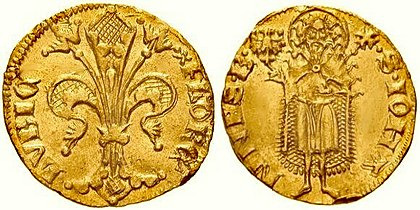#given the Heyder family's closeness with the Hawthornes
Text
Caribbean Currency 2
Continuing from the last post I made.

(Pictured: Florentine Guilder from 1341)
So I did a bit more reading around, mostly in the interest of grasping living wages and cost of living in the 17th and 18th centuries. In doing so I came across more in depth information about Dutch currency beyond the Lion Dollar, namely the Guilder.
Guilder, which is the English term for Gulden, which is German and Dutch for just “golden”, an informal term for “gold penny”. It is largely considered interchangeable with the Florin, as the currency was widely used all across the reach of the Holy Roman Empire. Anyway.
A Guilder was essentially worth half a Lion Dollar. Recall earlier, a Lion Dollar is worth between 4 and 5 Shillings in English currency. It takes 20 shillings to make a pound, thus 4 to 5 Lion Dollars to make a pound. Hence, it takes about 10 guilders to make a pound, so a Guilder is roughly equal to 1/10th the value of the pound or English Guinea. This is all noteworthy because the Guilder was the long accepted go-to currency for foreign reserves, likely due to its equal value and standing with the Florin and its widespread use across central Europe.
In reading on all this, I too found the values of ships were often rated in tonnage. Specifically about 20 pounds to the ton. Using some ships in Devil’s Eye for a quick reference...
La Demonia Roja, a massive Manilla Galleon, weighs in at 1000 tons of storage, giving it a massive value of 20,000 pounds.
The Barracuda, a simple schooner, weighs in at a mere 100 tons, giving it the value of 2000 pounds.
The Barracuda’s long standing rival and competitor from their piracy days, the Dutch vessel Diantha, being a converted Fluyt (a ship with a unique design meant to maximize tonnage without taking up too much area), weighs in with 400 tons for a value of 8000 pounds.
The HMS Cavalier, a 6th Rate warship oared frigate captained by an old former friend of Ravyn Hurley’s father, Post-Captain Jack Davenport, weighs in at 300 tons for a value of 6000 pounds.
For comparison’s sake, the annual wage of the First Lord of the Treasury of England was 4000 pounds. It’s a little sad that Ravyn’s pride of a ship is worth less than that, but such is life. Middle class wages were expected to be anywhere between 40 and 75 pounds a year, which is about what would be expected for a merchant trader who owned a ship. Given the costs of a ship and hiring a crew to captain and sail the ship, the loans must be outrageous. Despite that, a ship was a long term investment that often paid for itself several dozen times over several decades of use, which is why piracy for stealing such vessels was a lucrative business to begin with.
Other notable wages and fees of the 17th and 18th centuries include:
Coach rides were 5 pence per mile if you rode inside the coach, and 2 pence per mile if you rode on the outside.
River ferrying was about 3 pence per mile.
A cheap shared bed at an inn would cost you 2 pence a night - but an unfurnished room for rent would only cost 1 shilling a week, so it was actually cheaper to pay by week if you were staying over long term. (Things like this are again, why Ravyn needs Robert around to manage the crew’s finances!)
Servants only made between 2 and 5 pounds a year in earnings, but their estate would pay for their clothing, food, and board, which were the most common and costly expenses of living at the time. A more experienced housemaid could make up to 8 pounds a year, and an exceptional housekeeper could make up to 15 pounds a year.
Lastly, it was generally assumed anyone making 500 pounds or more a year were considered wealthy to some degree or another. I don’t know how far up one must go the wealth ladder to be considered nobility or aristocracy, though.

As for the money the Heyder family pulls in, I’m still working that out. I’m imagining Robert having a fairly large amount of disposable income, but not enough to where he can just liberally throw money at any and every problem he comes across. Otherwise it would start begging some questions. I’ll get back to that later.
#OOC#real history#given the Heyder family's closeness with the Hawthornes#and the fact both of Robert's sons work jobs#it wouldn't make sense for the family to be fabulously wealthy#but they are more comfortable than most#again im still working on it
6 notes
·
View notes